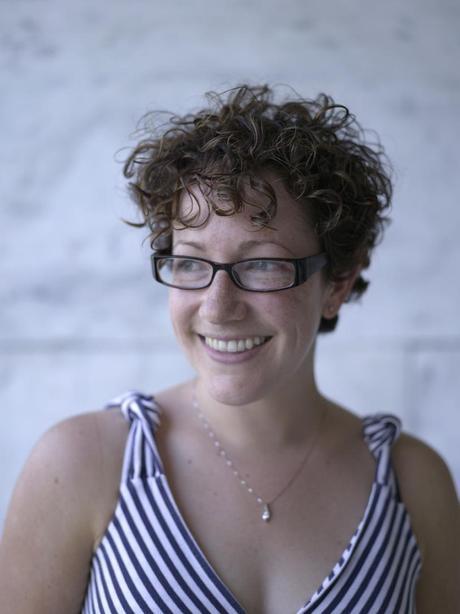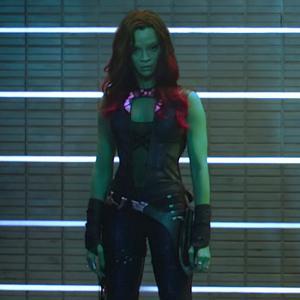Marvel’s Guardians of the Galaxy has been singularly associated with its writer/director, the lovable, social media savvy James Gunn (look at all of the pictures he released of his adorable dog on the set of the film!). He began his work on Guardians in September 2012, and though his commitment to the project cost him several girlfriends along the way it has paid off. The movie is here, people love it, and he’s suddenly the new Joss Whedon, a cult favorite catapulted to the A-list by a hit Marvel Studios film. Heck, Marvel just game him an Infinity Stone for his birthday!
Next up for Gunn is a Guardians sequel, due summer 2017. He spent last weekend working on the script, pausing long enough to thank all of his co-workers and social media supporters through Facebook. Not joining him in that Guardians of the Galaxy 2 writing session, though, was Nicole Perlman, the woman who at least officially co-wrote the first Guardians with him. Gunn is not inviting her back to work on the sequel because the way he tells it he never really worked with her on the first one.

Meet Nicole Perlman, the first woman to receive a writing credit for a Marvel Studios film
Of course, I built up to that like it was some kind of big secret that James Gunn actually shares the writing credit for Guardians with Perlman. However, by this point Perlman has been profiled in Time, discussed by NPR’s Pop Culture Happy Hour and Entertainment Weekly’s Karen Valby, and interviewed by The Hollywood Reporter and Topless Robot, just to name a few.
Karen Valby’s piece about Perlman went on to point to a recent Writes of Guild of America report that women currently account for just 15% of employed screenwriters (down 2 percentage points since 2009), and while better on the TV side of the equation it still leaves room for improvement when only 27% of current TV writing credits go to women. Since these credits are apparently so hard to come by someone like Perlman really stands out, joining the likes of Jennifer Lee (Frozen’s co-writer/co-director) and Kelly Marcel (handled screen adaptations duties for the upcoming Fifty Shades of Grey) in that regard.
For a variety of reasons, there is an overwhelming sentiment from the online community that Hollywood needs more female studio chiefs, producers, directors, and writers as well as more leading roles for women of all ages and races. So, yeah, right on Nicole Perlman. Score one of the geek girls of the world!

Gamora in Guardians of the Galaxy
And then James Gunn goes and says something like this in a recent podcast interview with Empire Film Magazine:
Empire: We have to ask the biggest question which is the evolution of the script.
Gunn: There were scripts that existed before I came in, and then I kind of re-wrote the entire script.
Empire: Like from top to bottom? Wow.
Gunn: Yep. There were a couple of little tiny things that stuck in there, but for the most part it was re-written totally.
Empire: So, what was it at the point that you first met it?
Gunn: There was a basic structure that existed – there were Guardians, it was basically the same 5 Guardians, Gamora and Quill got into a fight, which happens, they went to prison, all the other ones – Rocket, Groot, Drax – met in prison, they got out of prison, and there things kind of went in a very different direction than they go in our movie. The similarities are pretty much in the beginning, getting the orb was in that last version of the script, but even that was a lot more general.
Empire: Was it also a case of tone?
Gunn: Oh, yeah, the tone is totally mine. There was not any humor in the original drafts.
The way Gunn describes it calls to mind the way Joss Whedon wrote the screenplay for The Avengers. Marvel already had a script from comic book movie guru Zak Penn (X2, X-Men: The Last Stand, Elektra, The Incredible Hulk), but Whedon hated it, telling GQ, “”There was a script…there just wasn’t a script I was going to film a word of.” Penn had actually been working on his apparently worthless script since 2007, but as soon as Whedon was hired in 2010 he did a page-one re-write, removing Penn from the creative process entirely. At the time Avengers came out, Penn was busy prepping his X-Men-ish SyFy series Alphas, and did not seem to harbor any ill will toward Whedon, also telling GQ, “’We could have collaborated more, but that was not his choice. He wanted to do it his way, and I respect that. I mean, it’s not like on the Hulk, where I got replaced by the lead actor,’ he says, referring to Edward Norton’s infamous decision to install himself as lead screenwriter on that film. ‘That was an unusual one. This was more normal.'”

The result was that Whedon officially received credits for Avengers’ story AND screenplay while Penn only earned a “story by” credit, just as he had with X2.
Whereas Penn is a veteran writer who’s been around since the 1994 debacle Last Action Hero Perlman is just starting. In college, she wrote a screenplay about her personal hero, theoretical physicist Richard Feynman. It made the rounds in Hollywood, and led to potential similar projects, i.e., biopics about famous scientific figures, but her gender caused many to assume she’d prefer writing romantic comedies. So, in 2009 she entered the then-brand new Marvel Studios Writer’s Program because it was her best option to get a chance to write “a guy’s movie.” While in the program, she had complete freedom to write whichever script she wanted, but there was no guarantee it would ever get produced or that they wouldn’t hire a bigger name who’d completely re-write her work. Moreover, she was not allowed to go out and pitch anything else to any other studio during her time in the program. In other words, she was a contract writer exclusive to Marvel just the same way all the Hollywood studios used to have their house writers in the old days.
Marvel handed her a list of around 6 lesser-known Marvel properties, and let her pick the one which interested her the most. She’s not allowed to specify the character, but, yes, one of those 6 properties was a female superhero. However, that didn’t interest her. Instead, she picked Guardians because it was sci-fi and what geek girl doesn’t love that? She then proceeded to read every single Guardians comic book appearance published to that point, finishing the script and exiting the program after 2 years at which point they invited her back to do a re-write. Once Gunn came along in 2012 it pretty much ended Perlman’s time on the project, although she did get to visit the set during filming.
So, why did Penn only get a story credit, but Perlman earned a screenplay credit? Because Gunn didn’t re-write quite as much of her script as he makes it seem. Determining exactly who should be credited at what level on a film is initially determined by the involved studio, going off of Writers Guild of America regulations:
Any writer whose work represents a contribution of more than 33% of an adapted screenplay shall be entitled to screenplay credit [for original screenplays it must be at least 50%].
That 33% is not a simple matter of counting the number of lines and pages but a somewhat more in-exact analysis of dramatic construction, original and different scenes, characterization or character relationships, and dialogue. If the writers involved disagree with the credit they are to receive, they can to turn to the WGA for arbitration, which is usually kept hush-hush except for high-profile cases like the debacle surrounding the script for the first Sam Raimi Spider-Man film.
Or that’s how it is all supposed to officially go. There are countless uncredited re-writes for Hollywood films which result in a listed writer receiving far more praise/criticism than they deserve. For example, Iron Man 3 director Shane Black was famously cast in a small role in 1987’s Predator because the studio wanted him on-set at all times to perform uncredited script re-writes, and Guinevere Turner had her BloodRayne script totally re-written by schlock-master director Uwe Bowl but he still credited only her as the writer thus assigning most of the blame to her.

Heck, Perlman herself actually did an uncredited pass on the script for the first Thor during her time in the Marvel program.
Perlman got the credit for Guardians, but is it warranted? Obviously, the WGA felt so, but if James Gunn is really the one who made that script work does it then smack of tokenism to applaud Perlman simply because she’s a woman? Why, then, didn’t more people care that X-Men: Days of Future Past actually credits a woman (Jane Goldman) for its story along with 2 men (Matthew Vaughn, Simon Kinberg, with Kingberg getting sole credit for the script)? Or why aren’t male writers credited for a screenplay they may have actually had little to do with getting profiled in Time magazine?
Because this kind of thing happens all the time in Hollywood – someone works on a script for years, and is then replaced and discarded, resulting in a messy game of determining who gets credited at what level (story? screenplay?). However, it’s not very often that one of the involved parties is a woman. It’s a very common situation with an uncommon gender dynamic, and when Marvel Studios is the place that fired Patty Jenkins (Monster) without notice as director of Thor: The Dark World (allegedly infuriating star Natalie Portman in the process) it’s a legitimately big deal that Guardians is their first ever film to credit a woman among its writers.
For her part, Perlman has been consistently gracious for the attention and appreciative of the career opportunities afforded her by her involvement with Guardians, but wants more progress for female writers, telling Time, “I do still feel like it’s a little bit like, ‘Wow, it’s so crazy that a woman is doing this!’ I look forward to the time when it won’t be that crazy.”
It’s a copycat business, and with Perlman receiving so much industry attention for her work on Guardians it’s unlikely a coincidence that Sony just hired a woman (Lisa Joy Nolan) to pen a screenplay for a female superhero from the Spider-Man universe. Nolan should look to Perlman for inspiration on how to be a woman writing “a guy movie”:
“I like to think I can be just as good at blowing up things as I am at crafting relationships between characters. I went out of my way to try and tell a story that was a little more unusual because I didn’t want to bring anything that was weak to the table as a female writer. You don’t want to be a woman writer about whom people could say ‘a woman can’t write science fiction.’ I think that in that way it very much spurred me to do the best work that I could. But I didn’t add more romance because I was a woman or anything like that.”
Perlman’s time in this arena may not be over, either. She recently took to Twitter to reveal that she actually authored a treatment for a potential Black Widow movie back in 2011, although she’s not actively developing it at the moment.
Nicole Perlman will forever remain the first woman to receive a writing credit for a Marvel Studios film, even if her script was largely re-written. That’s progress, but for as much as the gender gap behind the scenes in Hollywood matters audiences are clearly going to more notice changes in front of the screen, like strong female characters [see: Guardians' Gamora and Nebula]. I then leave you with this brilliant and often hilarious flowchart from Twitter breaking down how best to write a female character in a movie:
Writing this weekend? Here's a little flowchart I put together to consider when writing your female characters… http://t.co/HiuFmaVoTI—
Miss L (@ProResting) August 09, 2014
What do you think? Do you even care if a movie is written or directed by a woman? Or is that a big deal to you? Let us know in the comments.

